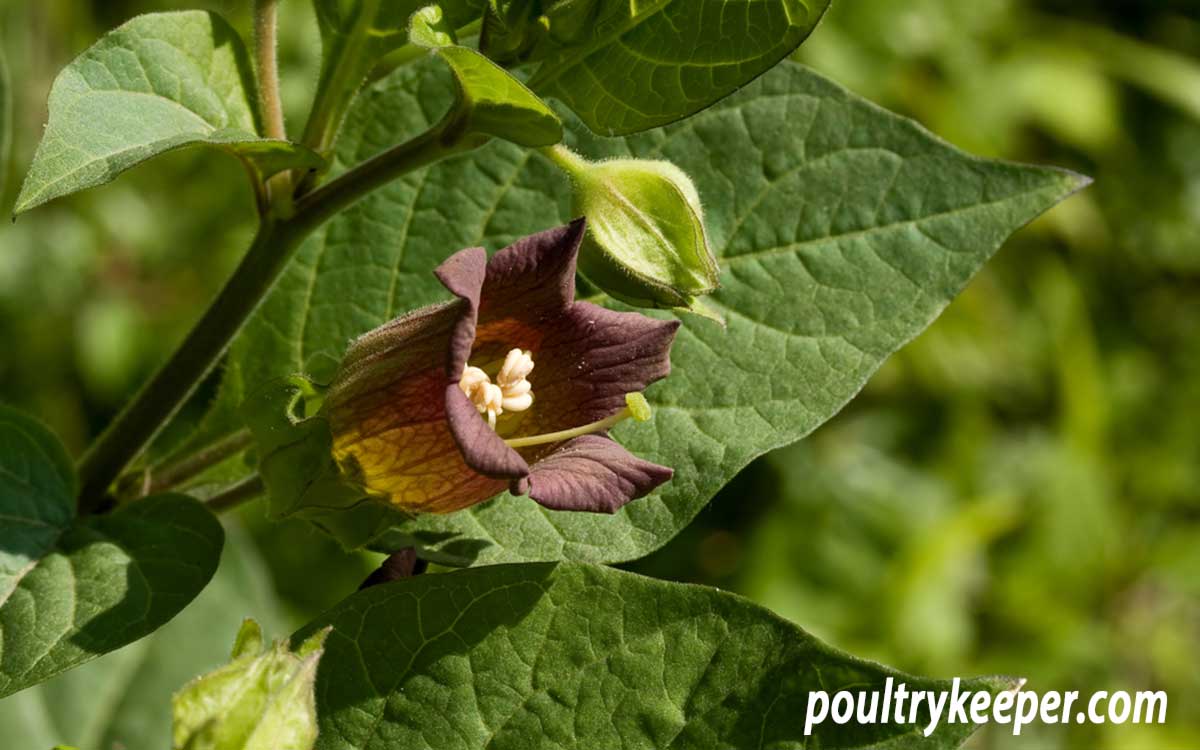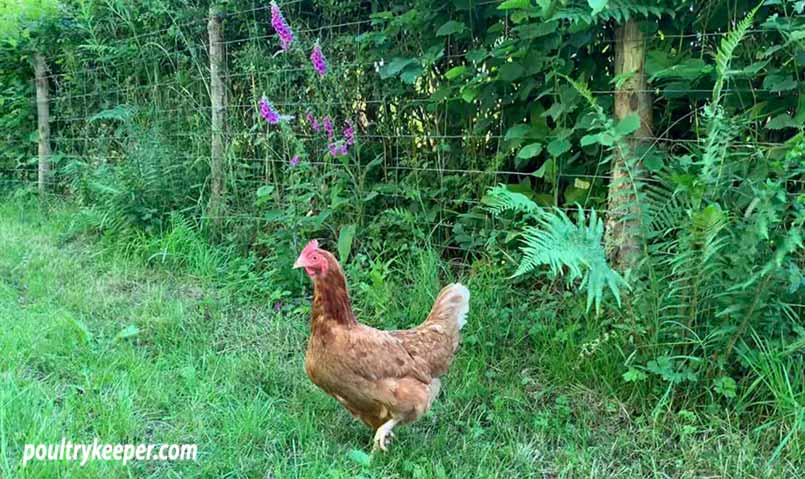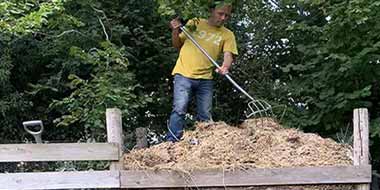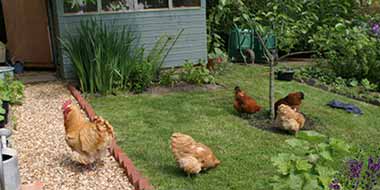
The last thing we want is to put our hens at risk of illness. This article provides a list of poisonous plants for chickens that you should avoid having in your chicken run and lists foods that you should not feed to your chickens.
Chickens are curious and will scratch around, pecking at most things, trying them out as they forage, and some native plants found in gardens or hedgerows can be poisonous to chickens.
Fortunately, they are quite savvy about what they eat, and it is unlikely a chicken will eat something that will harm them due to the bitter taste. Still, there is much more chance of them trying a poisonous plant when they are hungry or shut inside their run for extended periods.
Prevention is far better than cure, so if there are any plants you don’t recognise in your chicken run, it’s a good idea to try to identify them. If in doubt, keep potentially harmful plants away from your birds.
List of poisonous plants for chickens
Here is a list of some poisonous plants for chickens; it is by no means exhaustive, and I haven’t been able to test or verify whether they are deadly. (Of course, I’m not going to check them on my chickens!).
Not all parts of these plants are poisonous for chickens, and so don’t get too worried if you see them pecking at something they shouldn’t. Small amounts shouldn’t cause them any harm, they tend to know what’s best for them, but if ‘good’ plants for them to eat are in short supply, we don’t want these plants to be the only thing on the menu.
- (Black) Deadly Nightshade
- Bloodroot
- Bull Nettle
- Bracken
- Bryony
- Carelessweed
- Castor Bean
- Clematis
- Cocklebur
- Corn Cockle
- Curly Dock
- Daphne Berries
- Delphinium
- Some Ferns
- Foxglove
- Some Fungi
- Ground Ivy
- Hemlock
- Horse Chestnut
- Hyacinth
- Hydrangea
- Ivy
- Most ornamental Irises
- Laburnum (seed)
- Lantana
- Lily of the Valley
- Meadow Buttercup
- Oleander
- Potato Sprouts
- Privet
- Rapeseed
- Rhubarb Leaves
- Nightshade (Also called Deadly Nightshade)
- Rhododendron
- St. John's Wort
- Tulip
- Water Hemlock (Cicuta maculata L.)
- Yew
When looking around my smallholding, I found several poisonous plants for chickens: St John’s Wort in the meadow, Ferns and Foxgloves in the hedgerows, Yew in the hedge, Lily of the Valley and Clematis in the back garden, not to mention Rhubarb, Potatoes, and Tomato plants in the vegetable garden.
I don’t suggest you remove these plants; my chickens don’t tend to bother with them. I would only suggest being -AWARE- of these poisonous plants for chickens and not having them enclosed with them and without other vegetation: just in case they are hungry and bored and decide to try them. They are unlikely to pay them much attention; there are other things for them to eat and do in a large area.

As well as poisonous plants for chickens, Blue-Green Algae (a group of bacteria called cyanobacteria that have the appearance of algae when clumped together) found in water is also fatal. Ensure you keep your chickens away from bodies of water if you are in any doubt.
The following plants are ‘possibly not dangerous‘. I created this new list because we have had people say they have seen their chickens eating these plants and coming to no visible harm.
It is possible chickens may taste a little of something that could harm them in larger doses. Again, I can’t prove or disprove that plants are poisonous or otherwise; there isn’t any research on the topic that I can find.
Possibly not poisonous after-all list!
- Daffodil bulbs
- Elderberry
- Lamb's Quarters
If you have reason to believe there should be a plant added to one of these lists, or if you see your chickens eating significant amounts of a plant on my ‘poisonous plants for chickens’ list, please leave me a comment below. Hopefully, I can build a more precise picture over time to share with you.
Poisonous foods for chickens
As well as poisonous plants for chickens, some foods can also cause illness, and you should be careful not to feed these foods to your hens unintentionally.
- Mouldy food – hopefully, this is an obvious one to get out of the way! When food goes bad, there are harmful mould spores that can cause illness or death.
- Chocolate – methylxanthines theobromine contained in chocolate is toxic. Most of us know chocolate is poisonous for dogs, which metabolise theobromine much more slowly than humans. There are also studies to estimate lethal doses in cats, dogs, rats and mice, and there have been cases of chickens becoming seriously ill after eating chocolate.
- Members of the onion family (onions, garlic, shallots, spring onions) contain thiosulphate, which will not digest easily. This substance can cause chickens to become ill since thiosulphate causes the protein, haemoglobin, carried by red blood cells, to form clumps. These clumps cause red blood cells to rupture.
- Avocados – These contain person, which is toxic to most pets. Chickens are susceptible to persin poisoning, and half an avocado can easily be fatal. They will have difficulty breathing and accumulate fluid in the upper respiratory tract and around the heart.
- Salt – Salt poisoning is a well-known issue, and there are several documented cases of salt poisoning from mixing errors at feed mills. Do not feed salty foods to your chickens.
- Green Potatoes – Solanine is a glycoalkaloid poison found in species of the nightshade family. This family also includes tomatoes and aubergine or eggplant).
It can be in any part of the plant, including the tubers, so do not feed plants to chickens. The majority of solanine is in the skin of a potato. Green skin colour suggests solanine build-up in potatoes as well as a bitter taste. It’s thanks to the bitter taste that poisoning is rare.
General advice on feeding chickens
What are you allowed to feed chickens (in the UK)?
There is a lot of confusion surrounding what you are allowed to feed to chickens in the UK. Since the BSE (Mad Cow Disease) during the 1980s and its spread to other animals in the early 1990s and then the Foot and Mouth Disease in 2001, DEFRA banned feeding food scraps from kitchens to animals.
You can feed ‘allotment scraps’ or ‘garden scraps’, that is, vegetables from the garden that haven’t been into your kitchen, but you cannot feed food scraps or anything that has gone into your kitchen, and you must not feed any animal products to your chickens.
You should be careful what you feed your chickens because they will soon stop laying eggs if the protein levels drop or put on too much weight.
You can read my article on feeding chickens in much more detail here.




